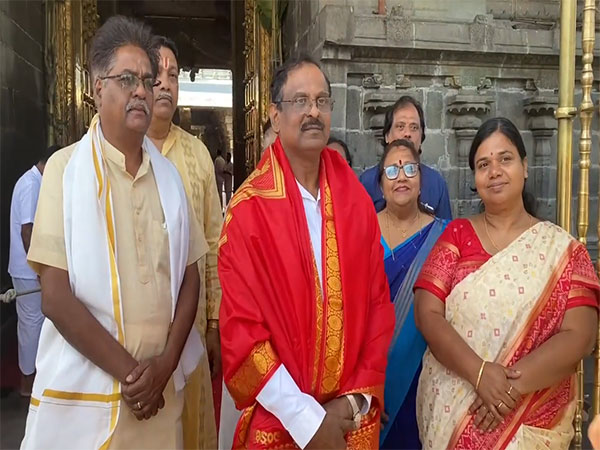
In Tirumala, Andhra Pradesh [India], on January 28, ISRO Chairman Dr. V. Narayanan, along with a team of scientists, visited the Lord Venkateswara temple in Tirumala, just before the scheduled launch of the GSLV-F15/NVS-02 rocket on Wednesday.
They placed a scale model of the rocket at the feet of the deity and held special prayers for the mission's success.
Speaking to ANI, Dr. Narayanan expressed gratitude for the Prime Minister's decision to allocate 400 crores for the third launch pad at ISRO, enabling the launch of heavier rockets into space.
He said this would enable the launch of heavier rockets into space. He also prayed for the success of ISRO's upcoming missions and gave thanks to the divine blessings for their accomplishments.
India's space agency, ISRO, is preparing for its historic 100th launch from Sriharikota tomorrow, with the GSLV-F15/NVS-02 carrying the NVS-02 navigation satellite scheduled to rocket into space at 6:23 AM from the second launch pad.
According to ISRO's release, it is the 8th GSLV operational flight with an indigenous Cryogenic stage. Notably, GSLV-F15 features a metallic payload fairing with a diameter of 3.4 meters. The GSLV-F15, equipped with an indigenous Cryogenic stage, will place the NVS-02 satellite in a Geosynchronous Transfer Orbit.
The GSLV-F15/NVS-02 mission is expected to further strengthen the NavIC system capabilities with the addition of advanced features.
Navic, or India's Navigation with Indian Constellation, is a regional satellite navigation system that provides accurate position, velocity, and timing (PVT) information to users in India and extends its services 1500 km beyond the country. Two types of services will be available through Navic, including the Standard Positioning Service (SPS) and the Restricted Service (RS). According to official statements, the SPS will have a position accuracy of better than 20 meters and a timing accuracy of better than 40 nanoseconds within its service area.
